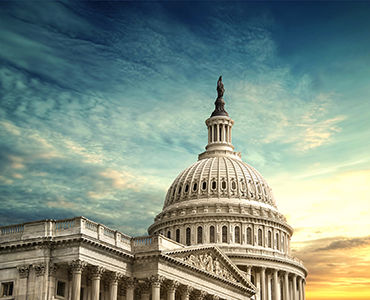At his address before Congress Tuesday evening, President Trump hinted at some priority tax policies for his second term, including fully restoring a provision of the Tax Cuts and Jobs Act (TCJA, P.L. 115-97) currently set to phase out at the end of next year.
“[A]s part of our tax cuts, we want to cut taxes on domestic production and all manufacturing,” said Trump during his speech March 4. “And just as we did before, we will provide 100% expensing. It will be retroactive to January 20th, 2025.”
Trump referred to bonus depreciation, a policy that allows businesses to immediately deduct expenses for investments in depreciable assets like equipment and qualified improvement property, as well as certain intangible property like software. Through 2022, the TCJA provided a 100% bonus depreciation rate for businesses that cannot claim the Code Sec. 179 business expense deduction.
Bonus depreciation began phasing out in 2023 by 20%. Under current law, this 20% annual phase-out will continue until reaching 0% in 2027. The 2025 bonus depreciation rate is 40%.
A Congressional Research Service (CRS) report updated March 3 said the Joint Committee on Taxation previously estimated the cost of extending 100% bonus depreciation through 2034 would be $378 billion.
“The cost would be higher for a permanent expensing provision,” the CRS report continued. “The 10-year cost is offset by gains beginning in 2024, as expensing costs are more than offset by the reduction of depreciation deductions that would otherwise occur over a period of years. For a permanent provision, there would be a steady-state loss due to growth in the economy.”
In a Congressional Budget Office (CBO) analysis of TCJA extensions released last May, the CBO forecasted that “[i]ncreased net interest outlays would add $91 billion” to deficits on top of the $378 billion deficit over fiscal years 2025-2034.
“The business community and some tax policy experts have advocated for maintaining 100% bonus depreciation, asserting that doing so can grow the economy and create jobs,” wrote Andrew Lautz and Arianna Fano of the Bipartisan Policy Center in reviewing the CBO estimates. “Some have argued that the maintenance of 100% bonus depreciation is even more valuable in a time of high inflation, since inflation will erode the value of investments that must be depreciated or amortized over several years rather than all at once.”
The CBO in December created a slide deck about how bonus depreciation is factored in its CapTax model, which measures federal tax policy effects on capital investment. “Cost-recovery allowances, in particular, are important in determining the user cost of capital,” the CBO explained. “Examining how variations in cost-recovery allowances affect investment is important for assessing the role that changes in tax policy play in explaining fluctuations in investment.”
Should 100% bonus depreciation be in effect in 2027, the overall user cost of capital across all assets (except for land) would drop 2.3% that year. By 2034, private investment would increase 1.5% for non-land assets, resulting in a 0.3% bump to gross domestic product, the CBO model predicted.
On January 10, the Treasury Office of Tax Analysis projected the permanent return of full expensing would result in a $735 billion revenue loss from fiscal years 2026-2035. The first year would see the biggest hit at $217 billion, but losses would be more evenly distributed across subsequent years. The Tax Foundation also estimated that the policy would provide boosts to GDP, capital stock, and wages.
Other business tax programs amended by the TCJA include the Code Sec. 174 requirement that businesses amortize research and development expenses over five years, and the Code Sec. 163(j) business interest expense deduction limit.
The cost of reverting those changes in addition to permanent full expensing would be $648 billion over a 10-year window, according to the Tax Foundation. Under the House-passed budget resolution, the Ways and Means Committee has $4.5 billion in wiggle room to permanently extend the TCJA.
Bonus depreciation, said Trump before Congress, “was one of the main reasons why our tax cuts were so successful in our first term.”
Lisa Wolski, managing director at Washington Council EY, shared with Checkpoint that Trump’s mention of bonus depreciation indicates that “pro-growth policies will continue to be a focus, even as Congress also hunts for revenue offsets to make the numbers work.”
Wolski added that she expects “Congress will include some tax increases on businesses to offset the cost of the provisions that have already expired and to make room for the President’s new proposals.”
For more on bonus depreciation and how full expensing compares with the Section 179 deduction, see Checkpoint’s Federal Tax Coordinator ¶ L-9902.1.
Take your tax and accounting research to the next level with Checkpoint Edge and CoCounsel. Get instant access to AI-assisted research, expert-approved answers, and cutting-edge tools like Advisory Maps and State Charts. Try it today and transform the way you work! Subscribe now and discover a smarter way to find answers.



